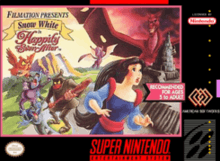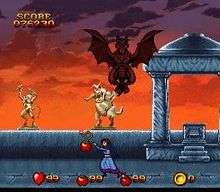Snow White: Happily Ever After (video game)
Snow White: Happily Ever After (also known as Happily Ever After in the 1991 version) is a North America-exclusive video game that was released in 1994 for the Super Nintendo Entertainment System. The game was targeted for female video game players. It is based on the 1990 animated Filmation movie Happily Ever After, and not the 1937 Disney film.[1]
| Snow White: Happily Ever After | |
|---|---|
 Cover art | |
| Developer(s) | Imagitec Design[1] |
| Publisher(s) | ASC Games |
| Programmer(s) | Steve Oldacre Paul Proctor[2] |
| Artist(s) | Marie Fox Peter Goldsmith Richard Lodge Jean Flynn |
| Composer(s) | Ian Howe[3] |
| Platform(s) | Super NES |
| Release | |
| Genre(s) | Action |
| Mode(s) | Single-player |
1991 version
Most of the film's main cast reprised their roles in the game, with the exceptions of Irene Cara, Malcolm McDowell, and Tracey Ullman, who were replaced by Jodi Benson, Enn Reitel, Mary Kay Bergman and Jeannie Elias as Snow White, Lord Maliss, Moonbeam and Thunderella, respectively.
1994 version
Most of the film's main cast reprised their roles in the game, with the exceptions of Malcolm McDowell, who was replaced by Frank Welker as Dragon Maliss, respectively.
Cast (Uncredited)
1991 version
- Jodi Benson as Snow White
- Enn Reitel as Lord Maliss
- Phyllis Diller as Mother Nature
- Michael Horton as the Prince
- Dom DeLuise as the Looking Glass
- Carol Channing as Muddy
- Zsa Zsa Gabor as Blossom
- Linda Gary as Marina and Critterina
- Sally Kellerman as Sunny
- Mary Kay Bergman as Moonbeam
- Jeannie Elias as Thunderella
- Lorelei King as Phoebe Olliphant and the Sweetheart Fairy Angel
- Angela Lansbury as Mrs. Potts and Jessica Fletcher
- Lisa Stansfield as Wendy Testaburger
- Alan Marriott (voice actor) as Lord Maliss X
- Tony Oliver and Edward James Olmos as the Spacemen
- Rob Rackstraw as Rocky Penguin
1994 version
- Jodi Benson as Snow White
- Frank Welker as Dragon Maliss
- Michael Horton as the Prince/Shadow Man
- Dom DeLuise as the Looking Glass
- Joanne Worley as Martel
Plot

Players follow the continuation of Snow White after the death of her stepmother, the Evil Queen.[1] The Queen's wizard brother Lord Maliss has vowed vengeance and changes Snow White's Prince Charming into a "Shadow Man" humanoid.[1] An entire kingdom must also be freed from Maliss' sorcery.[1] Players can play as either Snow White or her "Shadow Man" protector.[1]
Gameplay
Fruit and stars can be collected while apples can be thrown at enemies and blocks.[1] Players are given four continues to stop the evil Maliss. At the final stage, either Snow White or the Shadow Man confronts Maliss in his ultimate dragon form.[1] Players can change the difficulty level (ranging from easy to medium to hard) if the game gets too frustrating for them. A vast array of continues allow players to restart failed games.
Reception
| Reception | ||||||
|---|---|---|---|---|---|---|
| ||||||
References
- "Release information". MobyGames. Retrieved 2011-05-22.
- "Additional release information". GameFAQs. Retrieved 2011-05-22.
-
Frank Becker "Composer information" Check|url=value (help). SNESMusic.org. Retrieved 2011-12-14.